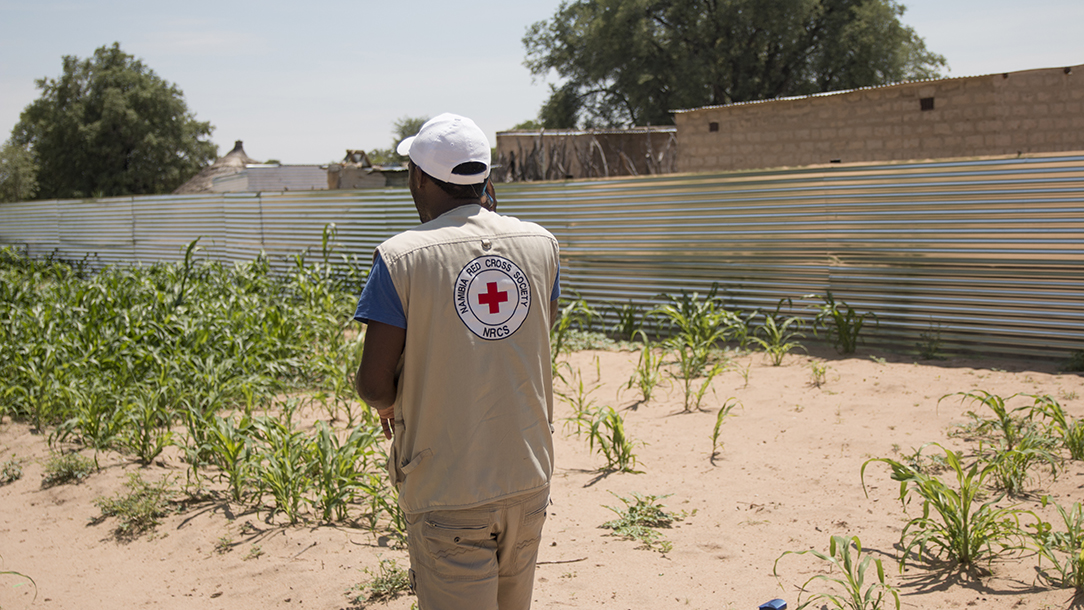World Food Day: why this year there is more work to do than ever
Coronavirus and the climate crisis are having a double impact on food security around the world
Last updated 4 August 2023
World Food Day 2020 also marks the 75th anniversary of the founding of the Food and Agriculture Organization of the United Nations.
One of the UN’s goals is to eradicate hunger globally by 2030. Sadly, we are falling far short of that goal.
The double impact of the coronavirus pandemic and the climate crisis this year has caused more people to go without food than ever before. According to the World Food Programme, 270 million people are nearing the brink of starvation.
Last year, an estimated two billion people around the world did not have regular access to sufficient safe, nutritious food.
The UN estimates that if recent trends continue, the number of people affected by hunger will surpass 840 million in 2030.

Namibia Red Cross is supporting vulnerable groups in three regions with food distributions, and are also rehabilitating water wells/ springs and boring after holes. (CREDIT: Thea Rabe/ Norwegian Red Cross)
“We stand on the precipice of disaster as climate change collides with coronavirus to create a humanitarian crisis of catastrophic proportions,” said Alexander Matheou, executive director of international for the British Red Cross.
“From droughts, to floods and plagues of locusts that destroy crops, climate-related disasters are not only likely to affect people’s ability to prevent the transmission of coronavirus, they are also destroying vital food sources, as coronavirus restrictions continue to aggravate the loss of livelihoods and reduce the food available in markets.”
WE STAND ON THE PRECIPICE OF DISASTER AS CLIMATE CHANGE COLLIDES WITH CORONAVIRUS.
While the coronavirus pandemic is an ongoing crisis that is far from over, the climate crisis remains the biggest long-term threat to humanity.
According to the UN, the pandemic could put up to 265 million people at risk of global hunger, with lockdown restrictions increasing the loss of livelihoods while reducing the food available in markets. But with weather becoming more extreme and unpredictable, millions of people’s ability to grow or buy food to feed their families is also being affected.
On the ground in Kenya
Kenya has faced multiple hazards in recent years, ranging from coronavirus to desert locusts and floods. Kenya’s Arid and Semi-Arid Lands (ASALs) make up 80 per cent of the country’s land mass and are home to around 14 million people. Due to climate change, the drought and floods affect communities in these areas at almost the same time, with no time for the affected population to recover.
The British Red Cross is providing additional funding to support 2,145 vulnerable households in Turkana, Mandera, and Garissa counties in the ASAL areas - among the places hardest-hit by these disasters. The households will be assisted through multi-purpose cash transfers.
As well as providing cash, we are working with local authorities and community elders to give information on coronavirus and desert locust control measures.
Further south in Southern Africa, people are facing a prolonged food security crisis affecting 45 million people. Consecutive droughts, a predominantly failed harvest last year, and a below-average harvest forecasted for the same period in 2020, present the risk of a grave humanitarian crisis.
Support in Zambezi
In Namibia, along the river Zambezi, we are working with 1,000 small-scale farmers to help them to manage their farms as small businesses. Working with the Namibia Red Cross, we will support farmers to adapt new farming techniques so that crops can withstand droughts and floods, as well as training farmers in financial and business management.
Part of this programme will involve training with Namibia Red Cross volunteers to support local savings groups - helping families build up savings they can use to buy food during droughts or floods. This is hugely important in a region where cyclical weather events (and now coronavirus) have a devastating impact on people’s sources of income.
This new programme has been made possible thanks to funds raised by players of People’s Postcode Lottery.
Namibia and Eswatini
Forewarned is forearmed and acting quickly on early warnings before a disaster strikes, can help save lives. Funding from the Foreign, Commonwealth and Development Office is allowing us to build on our ability to respond fast in the face of climate disasters.
Being able to act before a disaster will help the Namibia Red Cross and Eswatini Red Cross to partner with their governments and to strengthen work in areas like social protection and profiling, and continue promoting tools like cash and voucher assistance.
The pandemic has shown the importance of tracking risks and testing how prepared we are to deal with them in order to lessen their impact. But for interventions to be successful, the role of local communities and aid workers must be championed, now more than ever.
NEITHER THE CLIMATE THREAT, NOR THE CORONAVIRUS PANDEMIC WILL BE SOLVED OVERNIGHT.
A double crisis
Coronavirus has dominated the headlines in 2020, but this World Food Day we must not forget that for many, the pandemic is another crisis on top of an already-present climate crisis.
“Neither the climate threat, nor the coronavirus pandemic will be solved overnight”, said Matheou. “But these crises do threaten to reverse decades of humanitarian and development work to eradicate poverty and hunger, unless we turn our global commitments into actions, now.”
Learn more:
- Our work around the world
- Coronavirus: our work so far
- JB Gill visits Zimbabwe with the British Red Cross
Donate to our Disaster Fund
When a flood, hurricane or wildfire strikes, we need to respond immediately. Donate to our Disaster Fund and help us reach people quickly in future crises in the UK and around the world.
Donate to the Disaster Fund